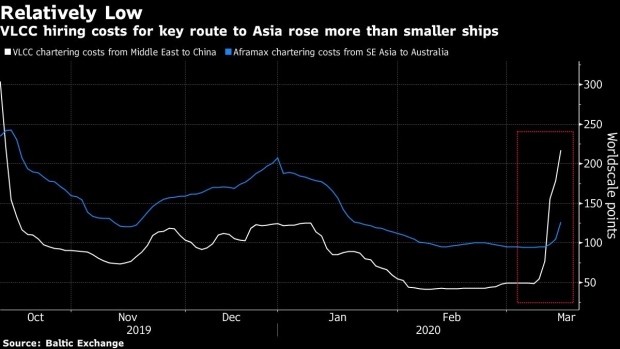Mar 16, 2020
Asian Oil Buyers Hiring Smaller Ships as Supertanker Rates Soar
, Bloomberg News

(Bloomberg) -- A growing number of Asian oil refiners are looking to hire smaller vessels to carry crude from the Persian Gulf after a Saudi Arabian booking spree spurred a surge in supertanker rates.
The cost of shipping oil on Very Large Crude Carriers on the widely referenced Middle East to China route has jumped around 350% over the past week. However, chartering rates for smaller Suezmax and Aframax vessels haven’t caught up yet, with the cost to hire an Aframax up just 34% over the period.
State-owned oil company Petronas, for example, provisionally booked Suezmax Odessa to carry Middle Eastern crude to its Malaysian refinery, according to fixtures and three traders and shipbrokers. Two Indian refiners also said they will use more smaller ships to import oil from the Persian Gulf.
Shipowners are reluctant to rent out their vessels on hopes that rates may rise even higher as supply tightened after Saudi Arabian tanker company Bahri booked more than 20 vessels this month, most of which were VLCCs. The kingdom has told customers it will significantly ramp up deliveries globally in the start of what could be a long and bitter price war with Russia.
See also: Saudis’ Oil Tanker Spree Drives 700% Surge in Ships’ Earnings
Bharat Petroleum Corp. and Hindustan Petroleum Corp. said they will use more Suezmaxes, which are capable of carrying 1 million barrels of crude, and even Aframaxes that can load about 650,000 barrels, rather than supertankers for the relatively short voyage to India. It normally takes less than a week to transport crude from the Middle East to the South Asian nation.
“The spike in rates will push people to restrict VLCC use for faraway crudes and prioritize shorter voyages in Suezmax and Aframax vessels,” said Hindustan Petroleum Chairman Mukesh Kumar Surana.
See also: Oil From Russia Far East Is Surging on China Demand, Low Freight
In the current environment of plunging prices and weak demand it’s better to break up the cargoes into smaller vessels as VLCCs have become too expensive, according to BPCL Refineries Director R. Ramachandran. “There’s plenty of Suezmaxes available in the market and low oil prices make importing in a Suezmax viable,” he said.
--With assistance from Dhwani Pandya.
To contact the reporters on this story: Debjit Chakraborty in New Delhi at dchakrabor10@bloomberg.net;Sharon Cho in Singapore at ccho28@bloomberg.net
To contact the editors responsible for this story: Serene Cheong at scheong20@bloomberg.net, Andrew Janes
©2020 Bloomberg L.P.


